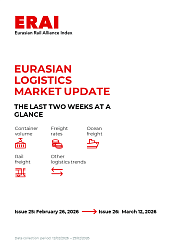Railway transport plays a pivotal role in Kazakhstan’s economy, accounting for over half of the nation’s freight turnover and handling the majority of export and transit shipments. In 2024, railways constituted 64 percent of total freight transportation. Recognising the sector’s strategic importance, the Government has launched several development programmes, including: the Concept for the Development of Railway Transport in the Republic of Kazakhstan until 2029, the Concept for the Development of the Country’s Transport and Logistics Potential until 2030, and the National Infrastructure Plan of Kazakhstan until 2029.
Owing to its geographical position, Kazakhstan possesses significant transit potential, creating opportunities for expanding and modernising its railway sector. The primary operator is the state-owned company Kazakhstan Temir Zholy (KTZ), which fulfils critical functions domestically and internationally. Recently, KTZ announced a tariff increase for backbone railway network services for export freight, effective 7 March 2025. This adjustment will primarily affect the export of raw materials.
The decision to raise tariffs has sparked widespread public debate. Business representatives express concerns over potential cost increases, which could undermine the competitiveness of Kazakhstani exporters. Meanwhile, proponents of the reform argue that tariff hikes are a necessary step to modernise railway infrastructure, enhance throughput capacity, and ensure the industry’s stable operation.
A key rationale for the increase is the urgent need to renew rolling stock and upgrade railway tracks. Infrastructure deterioration and insufficient investment have led to systemic issues requiring immediate resolution. Official data indicate that much of Kazakhstan’s railway fleet is outdated, and current funding falls short of financing the required repairs in full. Consequently, higher tariffs are viewed as a means to raise additional capital for developing the national transport system.
However, some experts argue that the reform demands a more balanced approach. Amidst economic instability, rising logistics costs could reduce export volumes, which may, in the long term, harm revenues for both the transport sector and the broader economy. Therefore, particular emphasis must be placed on striking a balance between infrastructure investment needs and maintaining the competitiveness of Kazakhstani producers in global markets.
Thus, the issue of railway tariff increases remains contentious. On the one hand, modernising infrastructure requires substantial financial investment; on the other, excessive transportation costs could weaken Kazakhstan’s international standing. Moving forward, a comprehensive strategy is needed — incorporating state subsidies, private investment incentives, and tariff policy optimisation — to mitigate adverse effects and foster sustainable growth in the country’s transport sector.



